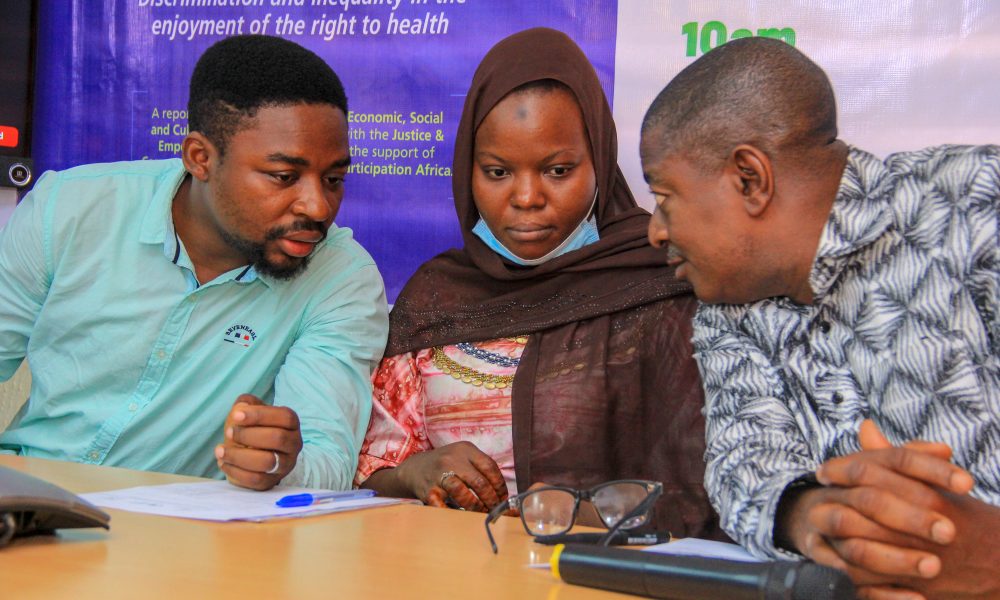A report released today by the Global Initiative for Economic, Social and Cultural Rights, in partnership with the Justice & Empowerment Initiatives and with the support of Corporate Accountability & Public Participation Africa, exposes how the commercialisation of healthcare in Nigeria has been amongst the main factors undermining the response to the COVID-19 pandemic in Nigeria, with harmful impacts on the right to health.
The report, entitled ‘The failure of commercialised healthcare in Nigeria during the COVID-19 pandemic: Discrimination and inequality in the enjoyment of the right to health’, details how governmental policies and international development actors have encouraged the growth of private and commercial healthcare since the late 1980s. More recently, successive policies have listed the creation of an enabling environment for public-private partnerships and private sector engagement in healthcare over 2004-2018. The National Strategic Health Development Plan (2018-2022) sets out as a goal the promotion of public-private partnerships in healthcare. As a result, an estimated 60% of all healthcare services are provided by the private sector, amongst the largest shares in Sub-Saharan Africa.
This highly commercialised system has not been able to cope with the COVID-19 pandemic. Nigeria has a critical shortage of lifesaving equipment to treat acute cases of COVID-19, such as ventilators, oxygen and qualified specialists. The country had only 500 ventilators in May 2020, against the 20,325 that would be needed to address the epidemic, and only 0.17 intensive care unit (ICU) beds per 100.000 inhabitants. Unfortunately, this was to be expected. Healthcare services are severely underfunded: health spending as a share of general government expenditure decreased from 7.3% in 2006 to as little as 4.4% in 2018, below similar African states such as South Africa and Kenya, and far below the 15% of their annual national budget to which the African Union States committed to in the Abuja Declaration.
Access to testing for COVID-19 is largely dependent on a persons’ socioeconomic background. Even if testing for suspected COVID-19 cases is provided for free at government laboratories, there are only 84 public testing laboratories as of February 2022 for a population of over 200 million inhabitants. This is clearly not enough, as evidenced by reports in the media that several public health facilities redirect suspected COVID-19 cases, including those with visible symptoms, to fee-paying laboratories due to lack of capacity and corruption. which charge as high as 50,400 nairas (132 USD) per test. Some private providers also add extra fees for ‘logistics’, up to between 60,400 and 100,400 nairas (159 – 264 USD) for a COVID-19 test, which is approximately two to three times more than the monthly minimum wage in Nigeria.
The report also finds insufficient regulation and monitoring of private health providers. In early 2020, private facilities were initially not allowed to admit COVID-19 cases for treatment because authorities had concerns over their quality, resulting in untapped capacity and empty beds when it was most needed. Partly because of lack of regulation, many private providers also offer substandard care and fail to comply with medical protocols. While academic study already signalled low quality of private provision in malaria treatment, during the COVID-19 pandemic private health facilities used expired reagents for COVID-19 testing and issued fake tests across at least two Nigerian states.
The report recommends:
• Increase governmental funding to health to at least 15% of the budget to meet the Abuja commitment and expand the availability of quality, well-coordinated public healthcare services
• Reverse the current policies intended to encourage higher for-profit private sector engagement in healthcare
• Ensure that all healthcare providers are strictly monitored and regulated at the federal, state and local levels
• Take concrete steps to ensure universal access to social healthcare insurance or another pre-pooled financing scheme
Key Messages:
• Health inequalities and inequalities in accessing healthcare services in Nigeria are inherent to the overall marketised healthcare system, where access to medical care, and thereby survival and dignified life, is highly dependent on one’s social and economic status, including during the COVID-19 pandemic.
• The commercialisation of healthcare in Nigeria is against the country’s human rights obligations to realise the right to health for all. Authorities must take urgent action to reverse this situation and provide healthcare services for all.
• Government-backed policies to increase private sector participation in healthcare are undermining the realisation of the right to healthcare, including pandemic response, preparedness and control. To face current and future pandemics, Nigeria has to invest its budget in resilient healthcare systems accessible to everyone without discrimination.
• Nigeria needs a strong public healthcare system to realise the right to health. Such a system has to be democratically managed, funded, and delivered by non-commercial actors, and reinforce the public healthcare sector’s capacity.
Quotes:
Rossella De Falco, Programme Officer on the Right to Health at the Global Initiative for Economic, Social and Cultural Rights, said: ‘Widespread commercialisation and privatisation of healthcare services stand in the way of the realisation of the right to health in Nigeria. Public healthcare systems are more resilient to shocks such as pandemics and are thus fundamental for the realisation of the right to health.’
Andrew Maki, co-director at Justice & Empowerment Initiatives, said: ‘Access to quality health services should not be determined by whether you are rich or poor. The government must do more to guarantee the right to health for all Nigerians — outsourcing services to private companies doesn’t fulfil this obligation.’
Akinbode Oluwafemi, Executive Director of Corporate Accountability and Public Participation Africa, said: ‘Commercialisation of healthcare services is not what Nigerians need. It will only lead to costs that are unaffordable for the poor and vulnerable. What Nigerians need is healthcare service that is publicly funded and available to all irrespective of social and economic status’
























+ There are no comments
Add yours